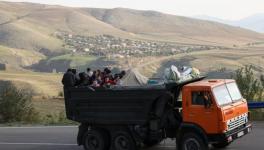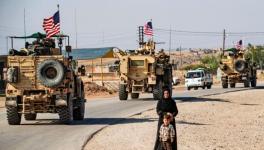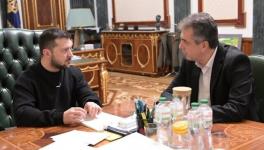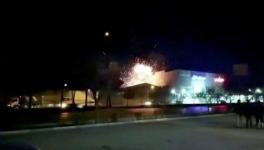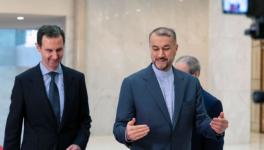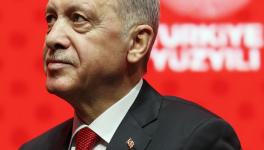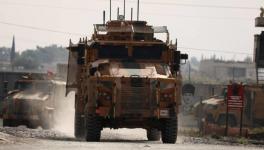Turkey Seeks to Crush Kurdish Aspirations for Statehood
Vijay Prashad, author of 'The Death of the Nation and the Future of the Arab Revolution,' says cracks are forming in the alliance between the US, Turkey, and Gulf monarchies
SHARMINI PERIES, EXEC. PRODUCER, TRNN: It's The Real News Network. I'm Sharmini Peries, coming to you from Baltimore.
Turkey renewed its attacks on positions of the Islamic State and on Kurdish militia on Friday. According to the Turkish government, it has now created a 56 mile corridor along its border with Syria that is free from the Islamic State fighters, as well as Kurdish fighters belonging to YPG.
This move has upset Washington because the Kurdish fighters were one of its main proxies in the war against ISIS.
Joining us now to discuss the situation is Vijay Prashad. Vijay is the George and Martha Kellner Chair in South Asian History and professor of international studies at Trinity College. His latest book is The Death of the Nation and the Future of the Arab Revolution.
Vijay, good to have you with us.
VIJAY PRASHAD: Thanks.
PERIES: Vijay, just the other day The Guardian had an article with the headline "Turkey's Syria Offensive Shows How Each Party Is Fighting Its Own War". Indeed, all the parties that are directly involved in Syria, whether it's Turkey or Russia or the U.S., are pursuing different strategies and objectives. Sometimes they work together, sometimes they work against each other. What do you make of this latest offensive and Turkey's expulsion of both ISIS and YPG fighters?
PRASHAD: Well, this particular Turkish incursion was a long time coming. The YPG, or the Syrian Kurdish fighters, have been making tremendous gains in northern Syria, so they were eager to get air power from somebody. But last year, the YPG very cleverly called a meeting of various other militia groups from different ethnic backgrounds, whether Turkmen on the one side, Arabs, Syriacs, different groups, Armenians, and they constituted out of this meeting the Syrian Democratic Forces, which pledged itself to a kind of Syrian federalism and vowed to be the military shield of northern Syria. That was the agenda that they put forward.
This, of course, then allowed the United States to come back them, because they're, after all, a secular force, they don't have any links to al-Qaeda, and they've been making tremendous gains against ISIS. So the United States provided close air support for the Syrian Democratic Forces who crossed the Euphrates River. And I think this is a very important point. They crossed the Euphrates River to go and seize the town of Munbij, which is on the western side of the Euphrates.
And in doing this, what the Syrian Democratic Forces have done was to come extremely close to creating a contiguous band of territory that stretched along the Turkish border from, on the one side, the northern Aleppo countryside all the way out to the Iraqi border. And if they have been able to create this continuous band of territory, this is precisely what the Syrian Kurds call Rojava, or the so-called Western province of Kurdistan.
And as you can imagine, the Turks, who have a very deep antipathy to the idea of Kurdish separatism, of Kurdish nationalism, had asked the United States and the Russians and others to make sure that the Kurdish militia stayed to the east of Euphrates and didn't cross the river. But, of course, this is not what happened. The Kurdish forces, with the others in the Syrian Democratic Forces, crossed the river, seized Munbij. That was a celebrated victory. And as they began to make a move towards Jarabulus, that's when the Turks entered.
So the idea that Turkey has entered this conflict to confront ISIS has very little credibility. What they really entered this conflict to do is to stop the Kurdish aspirations to create any kind of statelet inside Syria. And that's why the Turkish offensive is called Euphrates Shield, because they are going to be the shield of the Euphrates River to prevent the Kurdish forces from coming across.
PERIES: So these conditions is going to further intensify worsening relations with Turkey and U.S. How do you think the U.S. is going to react to this?
PRASHAD: Well, the United States is dancing around the issue of Turkey at present. You know, at the time of the failed coup in July 15, there were very large sections even of Mr. ErdoÄan's AKP party which suggested that the United States was behind the coup. And at the time, John Kerry hastily flew to Turkey to ensure that people understood that the United States wasn't behind that coup attempt. In a few days, Mr. ErdoÄan is going to meet President Obama. They're going to have to talk about the situation, I'm sure. The Turkish government has said that it wants the United States to have the YPG forces, the Syrian Democratic Forces, move east of Euphrates. The American military officer who's in charge of this liaison has said that, yes, the Syrian Democratic Forces will pull back across the Euphrates in order to go and make a dash at the so-called ISIS capital of Raqqa, which is on the eastern side of the Euphrates.
So everybody seems to be dancing around this question. Today the Turkish government has announced that the Kurds have indeed been pushed to the east of Euphrates, but the YPG denies this. They say that they are still on the western side. There's going to be a great deal of fancy footwork between Ankara and Washington to make sure that both Turkish goals here are going to be met, and at the same time to make sure that the Americans don't lose the only fighting force they have on the ground.
I mean, the upshot here, Sharmini, is that the Kurdish fighters need to understand that they're essentially being utilized in this war, but their goals, what they see as their goals, are not going to be allowed to be met.
PERIES: Right. And, Vijay, last time we were talking about Turkey, we were talking about Turkey-Russia relations. How would the Russians react to what's going on right now?
PRASHAD: Very interestingly, when the YPG created this Syrian Democratic Forces, around the same time, they opened that political wing, opened their liaison office in Moscow, because they had suggested that they wanted to have close ties with the Russians. They also suggested that they, like the Russians, don't take the position that the first path to peace in Syria is for the Assad regime to fall. So there was a kind of unity of purpose with the Russians at that time.
But, strikingly, the Russians are not making too much noise about what's happening in this little struggle between the United States, Turkey, the Syrian Democratic Forces, and Turkish proxies. They're not making too much noise here. And I think this is perhaps, from their point of view, a smart thing to do, because they want to maintain, I think, these new so-called warm ties with Turkey at the same time the Russians and the Americans are beginning to coordinate, much more intensely, bombing operations in northern Syria.
So I see the Russians sitting this one out. They can see that there's an important crack in the alliance that the West, the Turks, and the Gulf Arabs had created. And in the space of this alliance, as this begins to crack open, I think the Russians will have some advantages for themselves.
PERIES: Right. And finally, Vijay, do you see any possibilities or paths to untangle this situation that we are in in Syria?
PRASHAD: I mean, of course there are paths to untangle the situation. Of course there needs to be confidence-building through these humanitarian pauses that the United Nations has been insisting on. There needs to be a return to Geneva. I mean, all those things need to happen.
But the specific question of northern Syria has no easy answer. The Turkish government is simply not going to allow a Kurdish federation to grow in northern Syria. At the same time, the Syrian Kurds are not going to easily drop their own ambitions to create Rojava or the Western province of Kurdistan. And so this particular contradiction between Turkey and the Syrian Kurds is not going to be resolved in any easy fashion.
PERIES: Alright, Vijay. I look forward to your report next week. Have a great weekend.
PRASHAD: Thanks a lot. You too.
PERIES: And thank you for joining us on The Real News Network.
DISCLAIMER: Please note that transcripts for The Real News Network are typed from a recording of the program. TRNN cannot guarantee their complete accuracy.
Get the latest reports & analysis with people's perspective on Protests, movements & deep analytical videos, discussions of the current affairs in your Telegram app. Subscribe to NewsClick's Telegram channel & get Real-Time updates on stories, as they get published on our website.










